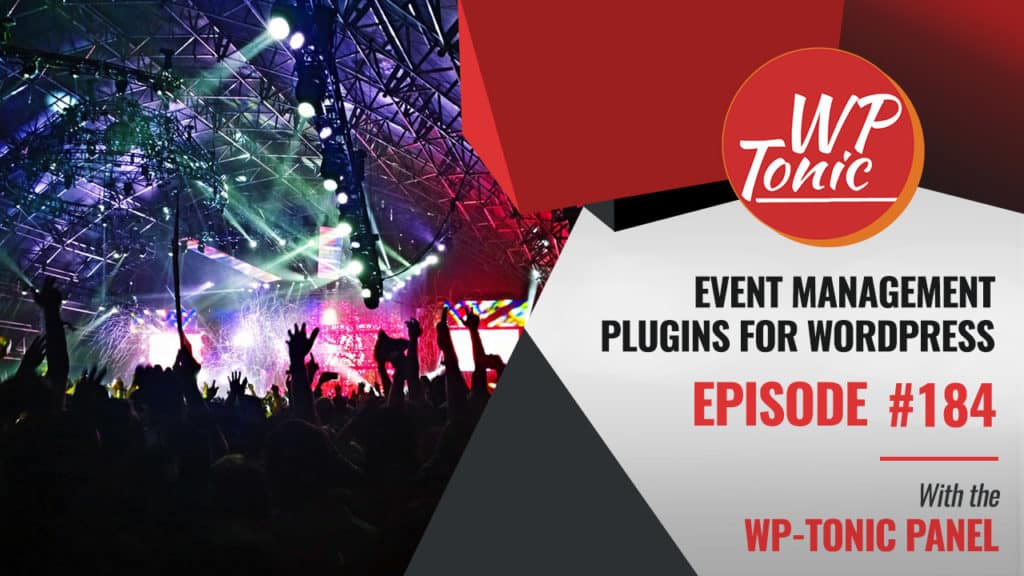
We look at WordPress event management plugins, what do they do, and when will you need specific ones? What if you run recurring events? Say you run a once a year event, and need to sell tickets? What if you’re a musician or band posting gigs? We give our recommendations for these scenarios and more.
Our episode this week is sponsored by Liquid Web. Liquid Web is offering a 33% discount for 6 months. Head over to LiquidWeb.com/wordpress and use the code WPTONIC33 at checkout for your discount.
Our WordPress Panel This Week:
Sallie Goetsch: from WP Fangirl
Kim Shivler: from HowToBuildAnOnlineCourse.com
Lee Jackson: from Angled Crown
Jonathan Denwood: from WP-Tonic
John Locke: from Lockedown SEO
WordPress News Stories for Episode 184
WordPress News Story #1: Advanced WordPress Facebook Group Moves to Curb Low Quality Content with Admin-Approved Posts
WordPress News Story #2: WordPress Editor Experience Survey Shows 75% of Respondents Don’t Use Distraction-Free Writing Mode
WordPress News Story #3: Recommended Reading: Resilient Web Design, a Free e-Book from Jeremy Keith
Main Topic: WordPress Event Management Plugins
We look at a variety of events management plugins in the WordPress ecosystem, and share our opinions and experiences with each.
Why Do You Need An Event Management Plugin in the First Place?
Sallie brings up a great point — many people use their blog to manage their events, and this leads to clutter. Things get out of date, but they are still on your blog. Essentially, your blog is not the place you want to managing events.
If you are in not in the position to write your own code to display events, using a events plugin is a great way to keep these appearances organized.
The Events Calendar
The Events Calendar is one of the most popular event management plugins in the WordPress space.
Kim noted that the PRO version of this enables recurring events, but the meta information is repeated, resulting in duplicate content. Kim says Events Manager does not have this problem.
Sallie says Modern Tribe sponsored some East Bay Meetups in the past, and she did some tutorials on The Events Calendar that became quite popular on her site. Sallie says one of the downfalls of The Events Calendar is there is no developer license (like Gravity Forms) that gives you access to all the add-ons, you must buy those individually. Sallie says one plus is that The Events Calendar has a program for non-profits, where you can apply for free software, but not free support. She says this is here default events management plugin.
John says he also defaults to using The Events Calendar, and recommends most clients to pick up a Pro license. He says he helped launch a public library site last year, and this is the plugin they use for managing events on their calendar.
Lee Jackson’s Unique Approach
Many people don’t know this, but Lee Jackson runs a whole side company where his team caters only to expos and conferences. You can find that over at EventEngine.tv.
Lee says many of the events plugins have too many features to make it easy to use for clients. At Event Engine, they use a Custom Post Type for Events, and use the post meta to display the information for upcoming events only – past events are hidden automatically.
He says you can even use the Calendar widget that already comes with WordPress to highlight days with events in them, and filter the Events archive.
For payments, Lee says he uses Gravity Forms with a payment gateway.
What If You Have One Big Event Per Year?
Lee says when setting up a conference or expo, there might not be recurring events, but one or two big events during the year. He brings up Comic-Con as an example – where you would have to list not only the venue and ticket prices, but the speakers, the presentations, and tons of other information that most events plugins can’t handle.
A plugin he recommends in this situation is Tickera. This allows you control registration, ticket sales, and a ton more. Tickera is modular, meaning there is a basic version, but you can add layers of functionality if you need to.
Thoughts on Event Espresso
Lee says he doesn’t like Event Espresso. He says it may sound stupid, but it is not visually appealing in the back end, and that makes it more difficult for people he’s helped to use it. User experience and user interfaces matter. If things look unappealing, it’s harder to get user buy-in. He says it is also a bit complicated to use.
Events Plugins for Musicians on WordPress
John says he takes care of a site for a classic rock band you would know, and they have Gigs Calendar rolled into their theme. He says that works for their purposes.
For most musicians, he recommends GigPress as a plugin for displaying their upcoming tour dates. Good gig plugins usually have data fields for venues, tour dates, and a means to purchase tickets.
Plugins vs. Software as a Service
Jonathan brought up an excellent point, that WordPress plugins aren’t really competing with other event plugins, but online SaaS.
John agreed and said that Tickera’s site had a tagline that read, it’s your money, which he thought was directed at Eventbrite. Online services like Eventbrite manage ticket sales for events, but take an ample cut of the money. Tickera seems to be a great option if you’re considering an alternative.
Lee says Tickera also has a WooCommerce bridge, and there are multiple ways to sell tickets through many events plugins using WooCommerce.
More Tips for Managing Events Through Your Website
Sallie mentions the plugin WooCommerce Registrations as a tool for selling tickets or webinar registrations.
She also says she used to have notes and slides for upcoming events, but what happens when that event passes?
One trick she uses now is to use the plugin Post Type Switcher to convert outdated events into Posts. This way, the old presentation info can be preserved, and it is quicker than copying and pasting between Event post types and default Post Types.
Other Events Plugins Mentioned During This Episode
Google Calendar Events
The Google Calendar Events plugin allows you to display any public Google calendar on your WordPress site. This one is mobile friendly. Perfect if you live inside your Google calendar, and don’t want to mess with adding events to your WordPress site separately.
Event List
This is a newer plugin that outputs a list of upcoming events via a short code. You can use the WordPress WYSIWYG editor for event details. Event List has data fields for event title, event date, event start time, event location, and event details.
Events Manager
Events Manager is a full-featured events registration WordPress plugin. There is also a Pro version of this plugin for increased functionality.
Event Organiser
A fairly popular event management plugin on the WordPress plugin repo. The Pro Add-on for Event Organiser has some robust features. These include booking management with customized forms, custom emails, venue custom fields, downloadable booking information, and payment gateways.
Join us each Friday at 9am PST to be part of our live show. You can ask WordPress questions and be part of the discussion.
To see a list upcoming Friday shows go to https://wp-tonic.com/blab/.
SUBSCRIBE ON ITUNES




